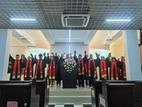Churches in cities (or coastal areas) should not only focus on spreading the gospel to migrant workers, but also should focus on cultivating, equipping, and training them for churches in underdeveloped areas.
Here I share two different cases with you.
Case 1
In a poor mountainous area in the mainland, most young and middle-aged people have moved to cities or gone to work in economically developed coastal areas. There are only a few old, weak, poorly-educated or illiterate laymen left in the church with a shortage of management and pastoral staff; as such, within the past few years, two rural churches in that area have closed one after another. Besides, many other rural churches are on the verge of closing. However, one of those rural churches saw a big turnaround two years ago. Here is the story. A young brother (hereinafter referred to as “Brother Y”) who went to work in the coastal area a few years ago, returned to the village after receiving theological equipment in other places. As a volunteer, he committed himself to that rural church, took the initiative to undertake the pastoral work of the church, and assisted the management staff with church management. Brother Y’s “sudden appearance” injected vitality into the rural church.
Y was led by his mother to the Lord in his early years and has maintained a relatively close relationship with God for a long time. After graduating from university, he went to work in a coastal city and attended church gatherings there. He later joined the youth fellowship of the church, and his spiritual knowledge began to grow; his spiritual life also flourished as well. He was then encouraged by his fellow church staff to participate in the ministry of the youth fellowship to help lead the Bible study. After that, the young believers at the church encouraged him to study theology because they saw how much he was committed to the gospel ministry and how gifted he was in teaching. Since then, he quit his job and enrolled in a theological school.
Four years later, he graduated with a degree in theology. Before graduation, he shared with the youth fellowship of that city church the desolation of the church in his hometown and his vision of returning to serve in the church. All the members in the fellowship supported him to serve in the church in his hometown, and some young believers offered to give him some help in his life to become the support of his ministry in his hometown. Therefore, Brother Y went back to his hometown and dedicated himself to the rural church there. His return not only promoted the various ministries he was committed to at that time but also brought encouragement and some life help to those young missionaries in other rural churches in his hometown. At present, Y has also become an influential youth pastor in the church in his home area, greatly promoting the youth ministry there.
In addition to God’s inspiration and protections, his current spiritual life and theological equipment, as well as his current service results in his hometown church, are entirely due to the cultivation of the church in the city and those young brothers and sisters who encouraged him to study theology, as well as the support of the young brothers and sisters in his life.
Case 2
In the early years, Brother W from a poor mountainous area went to work in a coastal area with his wife. Later, the couple successively became believers under the loving care and guidance of the church there. In addition, under the pastoral care of that church, their spiritual life continued to grow and they began to have a wonderful personal relationship with the Lord Jesus. As a result, they began to think about doing something for God’s family, especially Brother W, who was also very thirsty for spiritual knowledge and was determined to return to his hometown to be a pastor in his later years. With the aging of both parents and the need for them to take care of and carefully accompany their children who entered middle school one after another, they returned to their hometown to start a business a few years ago.
When they returned home, they desired to find a church for their spiritual needs. However, the original church in their village to which they belonged was closed for lack of pastors and management staff, as well as the attack from heresies. Believers there were scattered. Therefore, the couple organized several other believers who had worked in other places and returned to their hometown. They searched for the lost believers in the village and set up a temporary meeting point in their home by contacting the pastors of the local cCC&TSPM and obtaining the permission of the local religious administration department.
In this way, W began pastoral service based on the spiritual knowledge he learned in their previous church where they worked and the spiritual knowledge he learned on his own. His wife taught songs in this church based on the music knowledge she learned in the previous church (they were both volunteers). With reference to the church management model and organizational structure of their former church, they improved their current rural church and brought it back to life under the guidance of the pastors of the registered church in their hometown. At present, it has begun to take shape.
During one of my interactions with W, he told me that he felt inadequate in his pastoral work. Because he had been busy with work when he was in that area where he worked and did not get better equipment. At that time, there was no pastor in that church who paid special attention to and trained him.
However, I can say with certainty that the reason why Brother W was able to find the lost believers in his hometown and re-establish a meeting point was also due to the pastoral care and cultivation that he and his wife received from the previous church!
At present, the vast majority of young and middle-aged people in the rural areas which are underdeveloped in China are still working in cities, especially in coastal areas. The good news is that some urban (and coastal) churches have made an impressive effort to provide care for migrant workers, and thus have led a large number of migrant workers back to the Lord. Some churches in cities (or coastal areas) have begun to pay attention to the cultivation of migrant worker believers in their spiritual lives, and even encouraged or funded them to attend theological schools to prepare them for returning to their home churches to serve in the future, though not every city (or coastal) church’s pastor and fellow workers have seen this aspect of the ministry, and the churches that actually are carrying out this aspect of ministry are few. For example, in the two churches in the coastal area in the previous two cases, among the workers sent to the rural church in the underdeveloped area, Brother Y was encouraged to study theology by young brothers and sisters, which was the spontaneous action of believers. Brother W, on the other hand, was not encouraged to study theology, but only got some equipment in his regular meetings. Neither of the brothers received special attention in their growth from the pastors of the church in the area where they worked.
Therefore, I am taking this opportunity to remind churches in cities (or coastal areas) that while focusing on spreading the gospel to migrant workers, they should also focus on cultivating, equipping, and training them for churches in underdeveloped areas. Churches should also consider sending mature and theologically equipped migrant worker believers back to their home places to take part in the pastoral care and management of the churches there, or to preach and establish churches in their places of origin.
I suggest that churches in cities (or coastal areas) should look for believers who can be molded among migrant workers, focus on cultivation and training, and encourage and fund them to study theology. And I also suggest that churches in cities (or coastal areas), after providing solid theological equipment for migrant worker believers, send them as missionaries to serve the churches in their places of origin or preach and establish churches there.
Note: This article was written by a staff writer/freelance writer who is a pastor from Hubei Province and is originally published by Gospel Times. Opinions in the article represent the writer’s position for readers’ reference, and Gospel Times remains neutral.
- Translated by Stephen Huang












